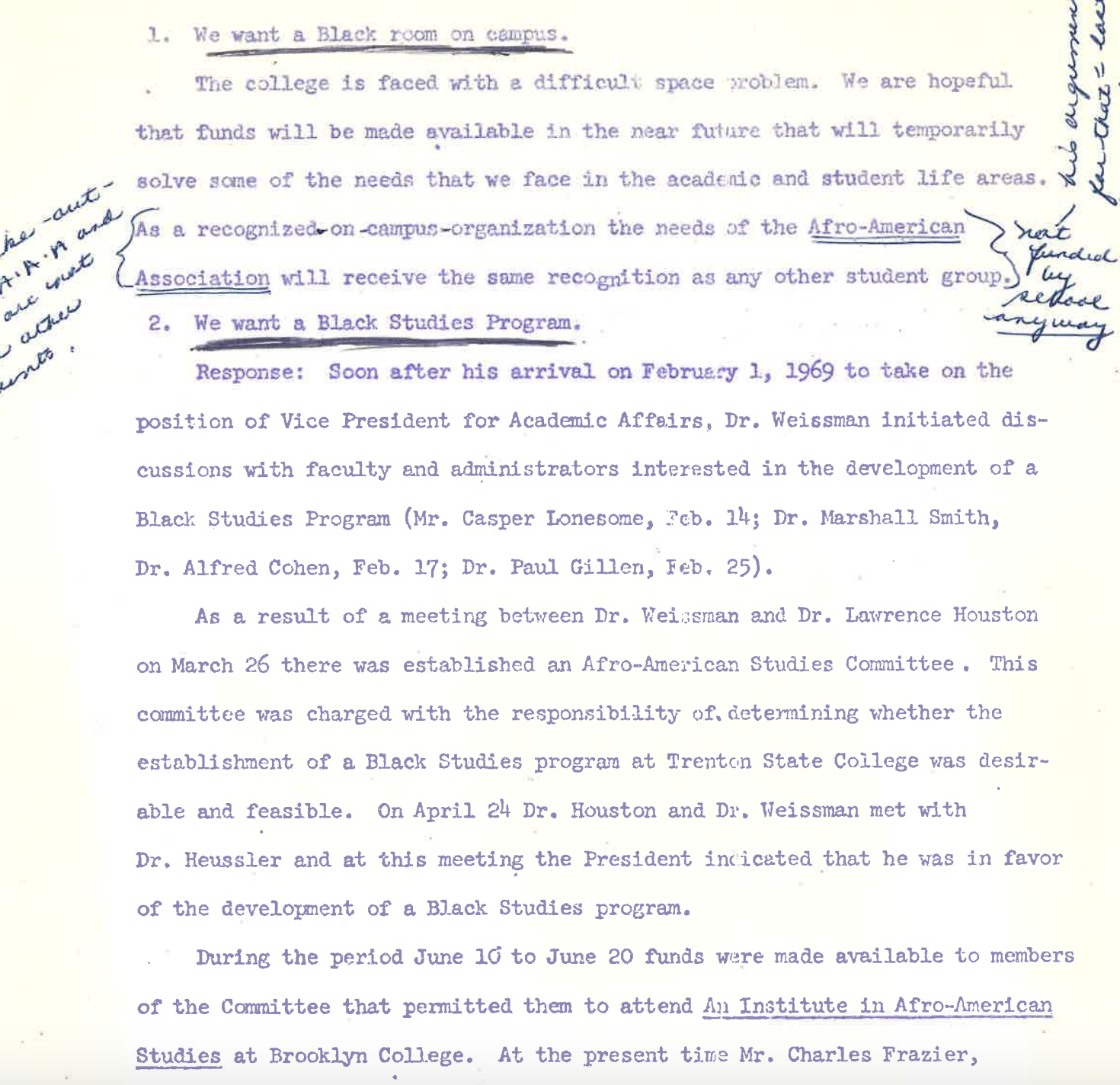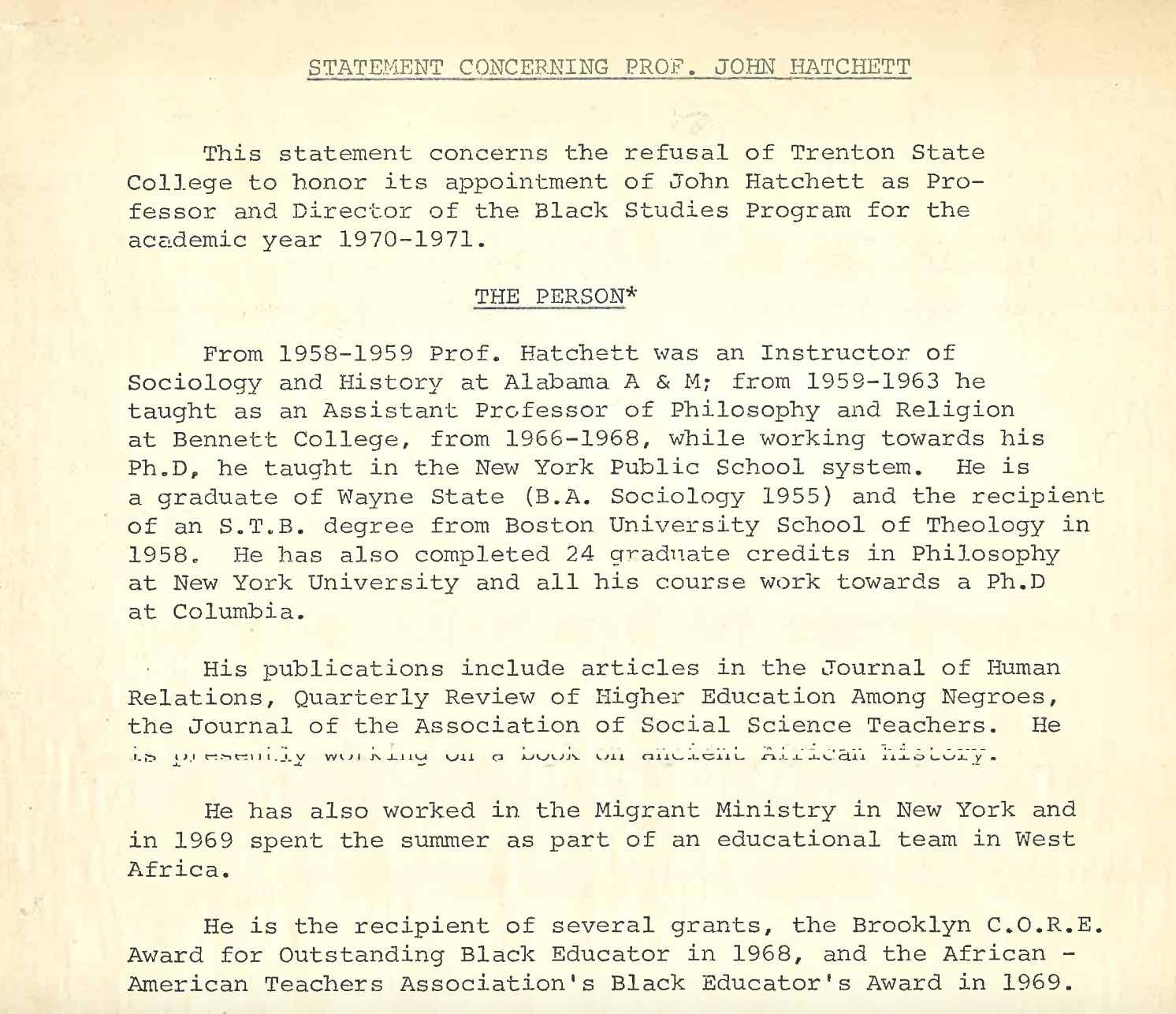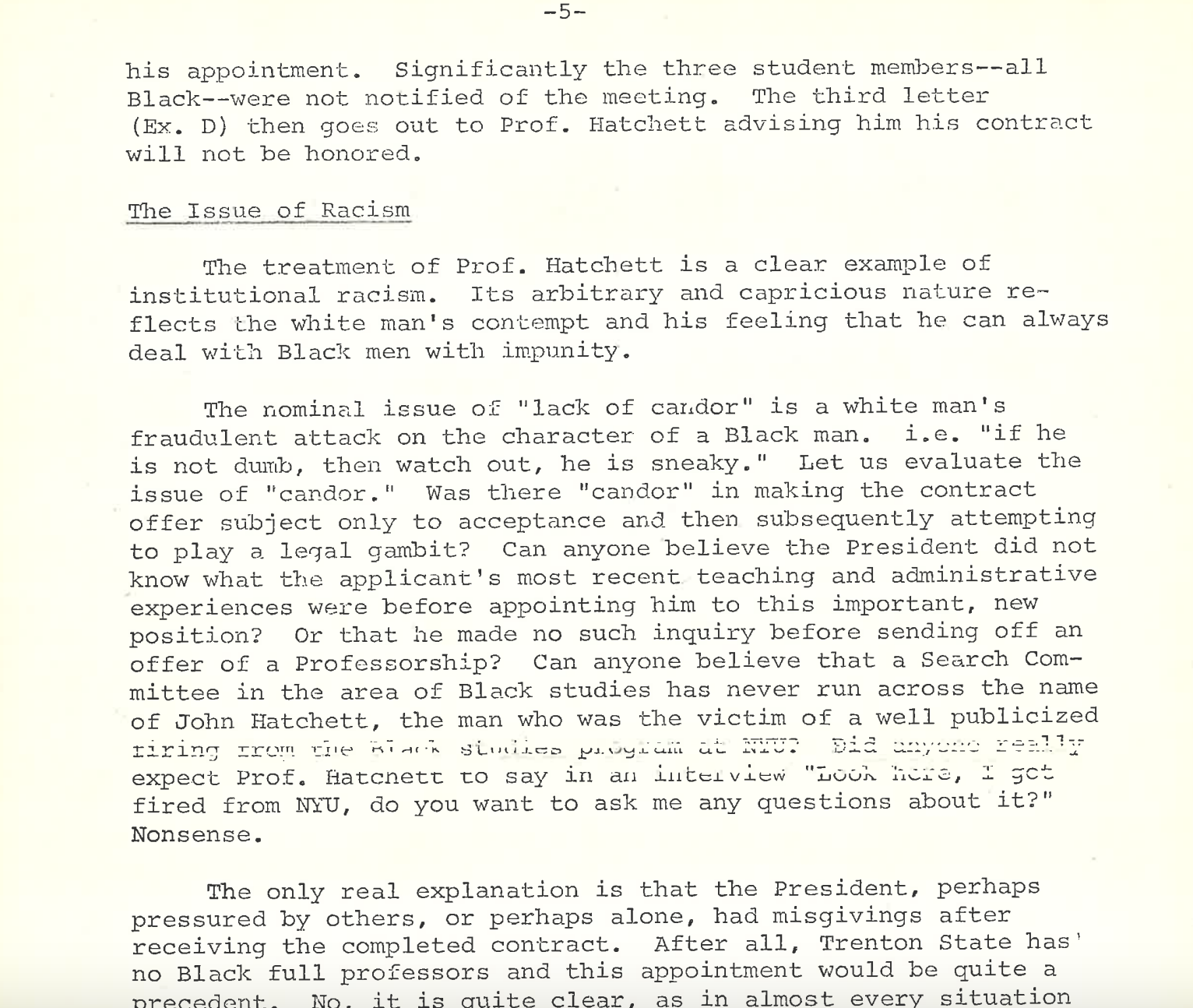Today’s importance and current state of Black Studies as an interdisciplinary Field
Dr. Mark Christian, a professor at Lehman College has been in the field of Black Studies for over 30 years; and is also involved in the National Council of Black Studies. With the interview conducted and a recent document from a NCBS annual conference that he shared with me, as well as relevant documents of TCNJ’s own history, we can better understand the importance for students to immerse themselves in Black Studies. During the oral interview with Dr. Christian, he touched on many important topics that will be covered below.
“Black studies as we know it in the contemporary sense came about in the Civil Rights Movement, and that was a struggle to have Black Studies in the mainstream curriculum. It’s important to point out Black Studies, the study of Black culture, or African culture and history has been going on for centuries and it’s being recorded. However, in the 1960’s there was a push by students (mainly black and progressive whites) to have Black studies entered into mainstream education because they wanted Black perspectives taught as well as the white perspectives that we have to endure as black students.”
Dr. Christian discusses the push for Black Studies following the Civil Rights Movement back in the 1960s with demands from students. This is similar to the riots/protests that occurred at The College of New Jersey after Black Students were being mistreated by campus police; and eventually made demands (in the document below) with one of them being the desire of a Black Studies Program to be implemented.

“The National Council of Black Studies is an organization that was set up in 1976, to bring all the black studies programs and departments together annually, to discuss the discipline and the development of the discipline, its ethos, and its credo is academic excellence and social responsibility. So therefore, you’re not supposed to just get an education, but you’re supposed to do something for your community. If you study Black Studies at the BA, MA and PhD levels, which you can now by the way, you can go right through your education system, studying black history and culture, if you want to do the PhD level. And if you do that, you have a certain responsibility to improve your community or your society in some manner.”
Dr. Christian talks about the NCBS organization that he’s a part of, and he stated he does not go out of his way to talk to young scholars but felt obligated to accept my interview request to help spread his knowledge to people seeking it, therefore carrying out his responsibility of improving his community by sharing what he knows so more people could be educated.
“When young students (white or black) take black studies, take it seriously. They see the transferable skills you can have and the broader knowledge you can have of society that can give any individual a broader perspective on humanity. And that has to be something administrations should take on board. Teaching an education has an aspect of, you know, improving society, if you don’t have that element, then why are we educating people if we’re not trying to bring people together to understand each other? We have to sing our own songs, you know, I’m using the trope of we have to sing our own songs, that means we have to tell our stories, you know, we have to, we have to continue against this backdrop of the resistance to black history and culture. You know, I have black students come up to me and say, but what can I do with a Black Studies degree? Dr. Christian? I said, well, what can you do with a history degree in medieval, and it’s the same thing. I mean, you study, you learn, you learn how to send synthesize knowledge, you learn how to use computers, how to write papers, how to articulate ideas, how to share knowledge, how to do group projects, how is that any different than an English class, or a history class that’s teaching you 19th century, you know, I don’t know the Gilded Age or something, you know, meaning Black Studies is as relevant as any other humanities, or social science subject matter. So that bullet, the stigma is very powerful. And students say I can’t do much with that. But they’ve been, in a sense, brainwashed against it. That’s another problem we have in the field. And that’s why Black Studies continues to publish books and research in order to, to overcome that.
Dr. Christian emphasizes the importance of taking Black Studies courses with the skills and knowledge that comes along with it, as well as how educating people of both and all sides of history is important to improve society. He then shares what he talks about in his article which was added to the NCBS annual conference report (attached below) in regard to challenges of Black Studies, and explains why students should not be afraid of wanting to study in this field.
“As we pass to the plus 50th anniversary of that era, we’re in a strange place. Black studies was established in a lot of colleges and universities, but still flimsy in many others; and even in the ones that it’s established, a student like yourself can take, or not take a black studies class, if you want to, most of them are voluntary. So many students black and white, and other can go through an education system today and still avoid black history and culture.”
Dr. Christian brings up how a student could avoid Black studies if they wanted to since many are optional and voluntarily. However, at The College of New Jersey there was the amendment of Liberal Learning requirements that requires a student to enroll in a Race and Ethnicity related course to graduate. As more colleges and universities make these changes, the fact is Black Studies is unavoidable because it’s half of American history alongside white history.
“In retrospect, if I considered today, as in the past, sometimes the past was better than today, because today, there’s an assault on the actual study of black perspectives. You know, it’s the colonic critical race theory, which is an aspect of Black Studies. And that’s been attacked by politicians of the right. Florida is one example where they’re actually putting in places to bar the study of black history and culture in a sense, in essence, you know? How do I feel about the progression of today’s world? I think we’re in a very precarious position right now. And there’s a very strong right-wing backlash to black perspectives in education. And really, you know, a black perspective is studying the experience of people of African heritage, essentially, in North America and the broader African diaspora as well as the African continent. I think it’s good for all students to know something about black history, given the tremendous problems we have with race relations. And what I would say in short, is that the presence seems to me problematic because of the assault from the right-wing, particularly right-wing politicians who are sullying the essence of what it is to study black history.
Dr. Christian discusses how Black Studies and critical race theory is under attack by right-wing politicians in particular. This is evident (in the document below), with the white administration of The College of New Jersey back in the 1970-1971 school year refusing to honor their appointment with Professor Hatchett specializing in Sociology and History while receiving many honors. At the time there was not one black professor at the college; and Presidents Robert Heussler (1968-1970) and Clayton Brower (1971-1979) faced pressure or might have had implicit biases resulting in cancelling the appointment.


“And the impediments to Black Studies, I’ve suffered that throughout my career, you know, the word Black still scares white academics. You know, black is scary to a lot of white people, which is ridiculous. And all it is, is a black perspective on looking at the world, you know, looking at the world through the eyes of those who have been discriminated against, in a sense, but still you can have white administrators and an academics who block the development, you know, I say, blah, blah, in a very nuanced fashion. It’s done with a smile. Now it’s done with ignoring them. I’ve just published two books on the pandemic, because I stayed at home and I wrote and I published, but I don’t get any kudos from my college or university for that. I have not received many things. But that’s kind of what happens to you now. And other scholars say maybe in mainstream history or political science, they’d be put on the front page of the website. So these things happen. So you have to have a really strong mind. If you stay in Black Studies. As a scholar, you have to have a very thick skin and a strong mind. Because if you don’t, you will then suffer greatly, you know, because there’s a lot of dismissiveness of what you do,”
Dr. Christian recalls his past pursuing his education in black studies with how he suffered and faced people that disagreed with him; and talks about how it’s still prevalent today.
“How we can improve things is very, very basic; and that is administrations have got to see the efficacy of the human family understanding each other because there’s a cultural war taking place in the United States. What we’re talking about here has an aspect of politics involved. We can’t avoid that aspect of reality. We have this problem of teaching African American history across the board from kindergarten, right through public schools to a university level. Because you have to go through some tricky terrain of oppression, and resistance to oppression. And I believe, well, I know that Black Studies itself has been a form of resistance to the pseudo-scientific racism, that emerged through education systems that have caused many young black people to feel that they’re not good enough and that is instilled indirectly through the broad stream education system.
Dr. Christian gives his perspective on what society could do for Black Studies to be accepted, promoted, and celebrated.